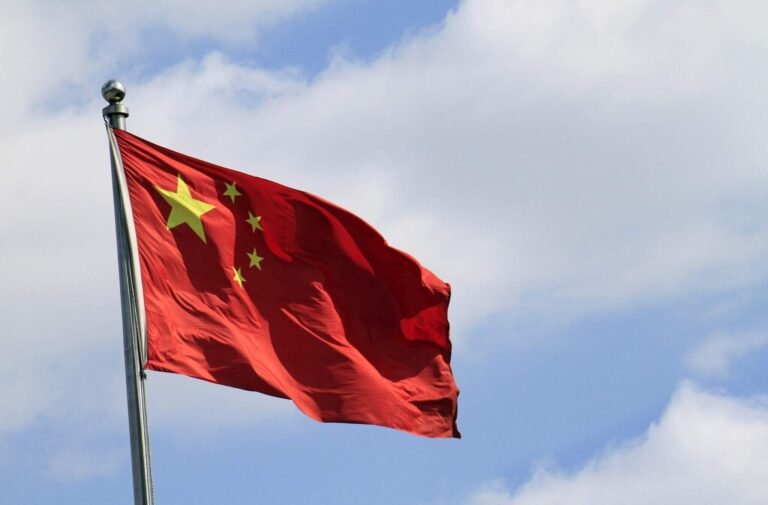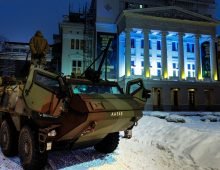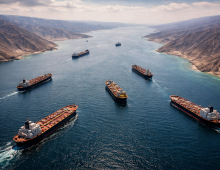Article authored by Viesturs Deksnis.
The Baltic Sea region has been facing a series of growing challenges that highlight its geopolitical significance and the urgent need for enhanced security measures. From repeated damage to undersea infrastructure to indirect threats like Russian drones violating sovereign airspace, regional stability is under persistent strain. Furthermore, Baltic nations are advocating for a broader NATO presence, with Lithuania recently expressing its willingness to host more U.S. troops, underscoring the region’s heightened security concerns.
In addition to military challenges, critical infrastructure projects such as Rail Baltica, which is essential for both economic development and military mobility in Eastern Europe, continue to face delays, raising concerns about the region’s preparedness in the event of a crisis. These issues, coupled with increased Russian hybrid threats, are dominating discussions among Baltic leaders and their allies.
To explore these pressing matters, Lt. Gen. (Ret.) Ben Hodges, former Commanding General of U.S. Army Europe (2014–2017), shares his insights on security in the Baltic Sea region, NATO’s evolving role, and the critical infrastructure investments needed to strengthen deterrence and resilience against ongoing threats.
I have read that allies of the United States are expecting US President Donald Trump to present a plan on how to end Russia’s war in Ukraine. Also, the administration has planned meetings and discussions with several countries such as Ukraine, Russia and others. What can we expect from this plan? Should other countries in Eastern Europe such as Poland and others also be involved in the process?
I think that this is a very important question with three or four components. First of all, I don’t know what to expect from the Trump administration’s plan. We don’t know the specifics. I’ve heard a lot of bits and pieces about negotiations, about a cease fire, about what Ukraine should be willing to give up and that sort of thing. I’m still not clear, however, about what the administration’s desired end game here is, other than to stop the fighting. Of course, when we talk about Russia there is no end game. Russia will wait before immediately violating whatever agreement they’ve made. I’m just not certain, and I don’t have confidence yet that the Trump administration is prepared to do everything that is needed to ensure and enforce any agreement. That concerns me.
I’m also, frankly, very frustrated that the Trump administration has not talked about the importance of the Black Sea region. As you know, Ukraine is not an island. It is part of a very important strategic region with NATO allies on the Black Sea and to the West of Ukraine, as well. The strategic thinking that they’re using – Kremlin talking points suggesting that Ukraine needs a new election. The Kremlin wants to delegitimise Zelensky. That concerns me, and I just don’t have confidence about where that’s going. I hope that I’m completely wrong and we’ll receive a great plan.
The second part to your very good question is – who else? I mean, this is not the 18th century where two brig countries got to divide up all of the others. I cannot imagine President Zelensky, for example, just sitting at home waiting to hear what the outcome will be and then having to deal with it. He won’t do that, and I think most Ukrainians wouldn’t accept any sort of settlement in which Ukraine does not play the critical role.
The third part of your question – yes, the rest of Europe has an interest in how this goes.
I can’t imagine that European countries, particularly Estonia, Latvia, Lithuania, Finland, Poland, Romania and Germany, will just sit and wait to see how it turns out, because anything other than a very, very positive outcome for Ukraine with strong security guarantees or an enforcement process will be bad news for Europe.
It means that you’ll have millions more Ukrainian refugees pouring into Central and Western Europe, Russia will wait another year for us to lose interest, and then it will resume what it has been doing. Everyone in the world knows that. I think, therefore, that Europe, countries in the South, as well as those which are members of the European Union, need to think about this – OK, we also have a role here.
The expansion of NATO with Finland and Sweden joining the alliance has meant important things about the security dynamics of the Baltic Sea region. How does the addition of these two countries affect regional security in the Baltic Sea?
The enlargement of NATO to include Sweden and Finland was important for several different reasons. Number one, the principle of enlargement that NATO chooses the countries which want to join the alliance. NATO chooses who does so, not Russia, and no one else has veto power. It was important that those two countries were added for that reason. It also reminded Russia that if the alliance decides to admit Ukraine and Ukraine wants to join up, then it will be up to NATO, not Moscow, to determine whether or not Ukraine can join.
Second, NATO got better the day Sweden and Finland joined. Both countries are strong, resilient and liberal-democratic societies, both have a strong defence industry, both have very capable professional militaries, as well as reserves that can be quickly mobilised.
Both countries have very good air forces and skilled naval capabilities that are obviously ideal for the Baltic Sea. We got better that day. We worked with Swedish and Finnish officers long before their countries joined NATO, so I’m very confident about them.
Third, from our geostrategic standpoint, the geography is obviously much more to the advantage of NATO at this time, and every country along the Baltic Sea apart from Russia is a NATO country. We should be able to improve our ability to control the Baltic Sea, to maintain surveillance and to prevent infrastructure damage and all of those things that Russia is trying to do. I think that pretty soon we’ll be in a much better place in terms of control of the Baltic Sea on its surface, underwater and in the air. Thus the improved geostrategic setup for NATO in the Baltic region obviously got much better, and it also gives us more depth as we start talking about the Arctic and the fact that it is becoming more and more competitive.
Trump urged NATO allies to increase defence spending beyond the current 2% benchmark, insisting that Europe must take greater responsibility for its security amid Russia’s ongoing war in Ukraine. Lithuania and Estonia have become the first member states of NATO to respond to Trump’s call, raising defence spending to over 5% of GDP. How important do you think it is to increase defence budgets, and how do you expect other NATO member states to respond?
Every nation is sovereign, of course, and it has to make its own decisions, but every nation that joins NATO falls under the Washington Treaty, which created the alliance. Article 3 of the Washington Treaty says that member states are responsible for their own defence, but they must also have the ability to help others. The 2% 3% or 5% are not in the treaty, but the obligation is. That means that the American president, whoever he is, has to go around and kick everybody in the ass to get them to do what they said they would do. Every president since Truman has complained that our European allies have not fulfilled their obligations. That’s a fact. European countries have failed to do this.
I think nations should do what they are supposed to do not because they are afraid of being scolded by the American president, but because they are members of the alliance and must ensure security for their own people. That’s what this is all about – protecting your people. You can’t put up a sign on the border with Russia reading “Hey, we spend 3% or 5%”. That won’t stop any tanks or armoured personnel carriers.
The issue is having trained and ready forces of women and men who are prepared to fight, do their job as part of the NATO team, and be integrated with strong, resilient societies. All of that costs money, so the leaders of each nation must explain to their population what the threat is, what the risk is, and why we have to do this.
I just cannot understand Germany. I understand politics there, and I understand their challenges, but at the end of the day, it’s about political will and priorities. I think Germany is losing credibility in Europe if it’s seen as hiding behind everyone else’s back from a security standpoint. I expect that things will change a bit after the German election on February 23, and we will have a different government. We’ll see if that enables the German government to increase spending, but they’re not alone, of course.
The UK is planning a strategic review of the size of the British army, and it cannot do what it’s signed up to do, it just can’t. The UK will have to make decisions about priorities. Everybody would prefer to spend more money on social programmes, of course, but the fact is that the first duty of any government is to protect its people. It must be clear about the risks and threats, and I have to tell you – I live here in Europe, and I have not seen any decline in the number of people who are going on ski holidays to Switzerland or Austria or are going to Mallorca. None. Airports are full of travellers. I’m not prepared to feel sorry for any country that’s having trouble in making tough decisions, and you can be sure that the Americans are looking at this, as well. American voters, not just Trump. All Americans who say wait a minute, why are we spending over three or four precent for all of our responsibilities, which includes contributing toward the protection of Europe, while Europeans and mini countries are not willing to do the same? That’s the problem.
Parallel to the ongoing war in Ukraine and the potential for peace negotiations, we see Russia testing NATO member states through various means, particularly in the Baltic Sea region. There have been acts of sabotage against underwater infrastructure in the Baltic Sea, thus targeting countries in the region. How would you comment about these actions, and what would you recommend as a response for the nations themselves and for NATO as a whole?
I don’t think that Russians think of themselves as being “at war” or “not at war.” For them, it’s a constant war of one sort another, and they use different weapons depending on what they want to do. At one extreme, of course, there is the threat of nuclear war or invasion.
At the other extreme there are criminal activities, disinformation, disruption of elections, and among all of that, you get into sabotage, destruction of underwater infrastructure, violation of sovereignty, violation of navigation rules and doing things like using “shadow ships” or operating in violation of international laws on delivering oil to China or India, for example.
They steal wheat from Ukraine and sell it to Egypt. These are the kinds of things that they are doing, and we must address this.
About three weeks ago in Helsinki, President Stubb of Finland hosted all of the heads of government from the Baltic nations, plus NATO Secretary General Rutte. They met to talk about these issues and what’s going on, and they came up with a plan which I believe had several solid measures in terms of what needs to be done. This is not a court of law where you have to have absolute and perfect evidence of who did what. We should not be all wrapped up in attribution, because 999 times out of 100 there is no accident. A ship simply dragged its anchor for 100 kilometres? Ridiculous! You have to be a terrible sailor not to realise that your anchor is dragging across the bottom of the Baltic Sea.
I think that Denmark has decided to begin to seize vessels in the Baltic Sea. I think every nation should be part of this, these shadow fleet vessels, many of which the EU calls “end of life vessels.” That refers to ships which are on the verge of creating an environmental disaster or some terrible accident at sea. It is appropriate and legal to seize the vessels that appear not to be in compliance with international law. I hope that other nations around the Baltic Sea will help Denmark in doing this. This is part of how you deal with it and have to do that. Russians must suffer consequences for their aggression and illegal activities. If not, they’ll just keep pushing, which is what they have always done.
We also see Rusia’s threats and testing manifested in other ways such as sending drones across borders. One recently crossed into Latvia. How should such issues be addressed, and what preventive steps can be taken in future to stop this from happening? Is it even preventable?
Yes, of course it is preventable. If Russia feared that there would be some sort of consequences, then it would have built a buffer zone to make sure that you don’t have drones or missiles that get too close. They fly over Romania, Poland, Latvia and other countries to avoid Ukrainian air defence and to come in from various directions. Yes, of course there is always the possibility of malfunction. Perhaps the drone was struck by Ukrainian air defence and went off course. This can be sorted out. The fact is that nobody believes Russia, because it is always violating the law, and it doesn’t give a damn about the airspace of other countries. Tough luck if the drone lands on the farmhouse of a poor Latvian farmer. I think that this is where our nations and the allies should lead the way, and the United States should be part of it. Even if not, however, nations have the right and the responsibility to protect themselves and their airspace.
If you are in Latvia, Lithuania or Poland and see a drone approaching your airspace, then you should first identify it and then shoot it down. You don’t know whether it will turn around toward Ukraine or land in your country.
It’s easy for me to talk about this, but it’s harder to do. Heads of government, of course, must be judicious, because they don’t want to something that will give Russia a reason to retaliate. If we were acting together, however, to protect innocent life … this is what the US and the Royal Navy do in the Red Sea. They are shooting down missiles which the Houthis have fired against international shipping. We did this with Israel. The US and the Royal Air Force with the help of Jordan, France and Israel, of course, aided in knocking down Iranian missiles that were heading toward Israeli cities. We simply shot them down. Why are we so reluctant to do the same with Russian missiles?
How would you assess the effectiveness of NATO and US troops in the Baltic States? A few weeks ago, Lithuania’s foreign minister said that his country would be willing to host more US troops. Should there be a response to such a request? Would it enhance the security of the Baltic States under the current circumstances?
Germany is going to have Brigada Litauen in Lithuania, and that is very good. It will be a very good, well-equipped and fully manned brigade that will be fully integrated into Lithuania’s defence. That is a good and positive development. I’d like to see the same level of UK and Canadian deployment in Latvia and Estonia, as well – just like what the US has in Poland. I like the fact that we have a US battalion in Lithuania, that we have helicopters which fly out of Lielvarde, and the fact that we are a part of operations out there. All of that is positive, but I would say that I’m not sure that simply adding more Americans would necessarily be helpful. The readiness of forces that are already there is the most important thing. If you have more troops than training facilities, for instance, or if you just have a garrison, that’s not much in terms of what you are doing. Lithuania is close to maximum capacity of trainee numbers over the course of the year. Latvia has Adazi. You have to have enough training space to be able to prepare for actual fights.
Then of course, we still have not completed the famous Rail Baltica project. Why should the US or any other country put more troops here if the countries are not willing to finish a very important mobility project. I think that would be hard sale. I would not be in favour of it until I saw that we have the infrastructure and the coastline reinforcement. Reinforcement, of course, is not going to come just through the Suwalki corridor from Poland. It will also come from Finland or Sweden across the Baltic Sea.
I’m also very interested in what we are doing in our alliance and the countries which are improving East-West transport corridors by land, rail and highway. Much work remains to be done, particularly from Norway to Sweden and Finland.
Finally, people in Estonia, Latvia and Lithuania must understand that they may need to fight for two weeks without any additional reinforcements. What’s there is there, and I want to emphasise that this is the worst case scenario in which we get caught by surprise, and the Russians prove able to launch some kind of attack to destroy reinforcement transport infrastructure.
It might take two weeks before additional Polish, German, British or American troops can show up through Suwalki or by crossing the Baltic Sea. Then there are the societies of these countries. Are they ready for this? Do people have ammunition, and are they truly prepared for the fight? I believe that this is even more important than placing additional NATO troops in these countries.
Defence is unimaginable without infrastructure, and the Rail Baltica project is central to this. As the largest railway infrastructure project in the Baltic States, its goal is to link Lithuania, Latvia and Estonia with Western allies, which is crucial for the military mobility of the Baltic States and offers the best solution to transport armoured vehicles and other heavy military equipment to the region. The project has faced increasing controversies, delays and escalating costs, and officials have raised concerns about the fact that the railway may not be operational by the current official deadline of 2030. Given that each country has slightly different progress in this project, how would you assess its importance from a military and defence perspective? What could be done to accelerate its completion?
One major issue, of course, is the need for rail gauges that are the same as in the rest of Europe so that you don’t have to stop the train and go through the whole process of off-loading or changing cars and rail gauges to fit the old Soviet system. This is about speed and how fast you can move things. In the pre-crisis scenario, we tried to convey to the Russians that we were prepared and could move a lot of things quickly. This is an important part of deterrence. The fact that this has been going on for ten years, though it seems like more, and that it’s not finished – that is a combination of mismanagement or a lack of urgency or whatever.
I was in Riga last fall at a security conference, and someone said that a part of the holdup was the building of a new main train station in Riga. A capital needs a big station, of course, but don’t tie progress on Rail Baltica to the new train station in Riga!
I think the focus should be on the military aspects of this rail project so that you can move rapidly all the way to the North and to Estonia.
My sense is that people know this and will eventually do it, but there does not seem to be a sense of urgency there.
In conclusion, I’d be interested to learn your thoughts about the potential new “axis of evil.” How viable, stable, long-term and strong could be a potential new “axis of evil” coalition among Russia, Iran, China and North Korea?
It’s important to keep our eyes open and to be realistic about the fact that they are working together in some way. Maybe they are planning and co-ordinating their strategies. I don’t know, but the fact is that Russia depends on North Korea, China and Iran for ammunition, troops, electronic components, drones and missiles. Russia needs them. Iran has no friend in the world other than Russia. Neither does North Korea. China views Russia as a junior partner and a petrol station. They do care about sending their ships over the Arctic, and that possibility is improving each year because of climate change.
From our standpoint, if we were thinking strategically and the four countries were linked together, then you would think about how to link them together in terms of a strategic approach, and then you begin to get a sense of the scale of what you need – forces, industrial capacity, ammunition production, troops, ships, all the infrastructure that they build to move among theatres, OK? Think of that as a long strategic whole. These are parts of one whole, and I think that you can then develop a more strategic approach toward defending those adversaries or potential adversaries. The way I would look at this is that if you defeat Russia first and help Ukraine to do so, then Iran will become totally isolated. It is already very weak, and with Russia having lost its ally in Syria, it’s even weaker. You have a chance.
If you defeat Russia, then Iran becomes totally isolated, and there’s a chance to end the current Iranian regime as a source of terrorist attacks, support for terrorism and disruption in the Middle East.
You defeat Russia, and North Korea becomes totally isolated. They have nobody to give them anything. China, of course, will be watching all of this, and if it sees that the West has the political will, industrial capacity and military capability to help Russia to defeat Russia and isolate Iran, I think that that would be a strong message of deterrence to Beijing. When you combine the economic and military power of the United States, Canada and NATO, it matters. It’s not ridiculous that we could help Ukraine to wipe the Russians out, so it really comes down to political will.
Let me finish with a historical example. In January 1942, the allies had no reason for optimism. Great Britain was alone in Europe, and the United States and North America had no desire to get into another conflict in Europe. Of course, the Japanese attacked us in the Pacific and destroyed or fleet at Pearl Harbour, so there was anger toward Japan, but not so much toward Germany. Churchill came to Washington, he and Roosevelt discussed this, and they agreed in January 1942 that there was time and reason that they should defeat Nazi Germany first. To keep Great Britain in the war and to allow the United States to build up and do what it had to do, the two countries realised that defeating Germany first was a strategic priority. A year later at the Casablanca conference, Great Britain and the United States agreed that the end goal was Germany’s unconditional surrender, as opposed to getting to a better negotiating position – unconditional surrender. This was in January 1943, and one year after Pearl Harbour Roosevelt could go to the American people and say look, this is what is at stake, we have to do this. He turned industry on a war footing, and the US Army grew from scratch to 12 million people in uniform very quickly. This was political will and leadership, speaking to our civilians and citizens as adults in terms of what was at stake. People got behind the move. That’s what we need now. We need somebody to prioritise, to talk about the end game and to mobilise our industry and population. That’s how you deal with such things.


















